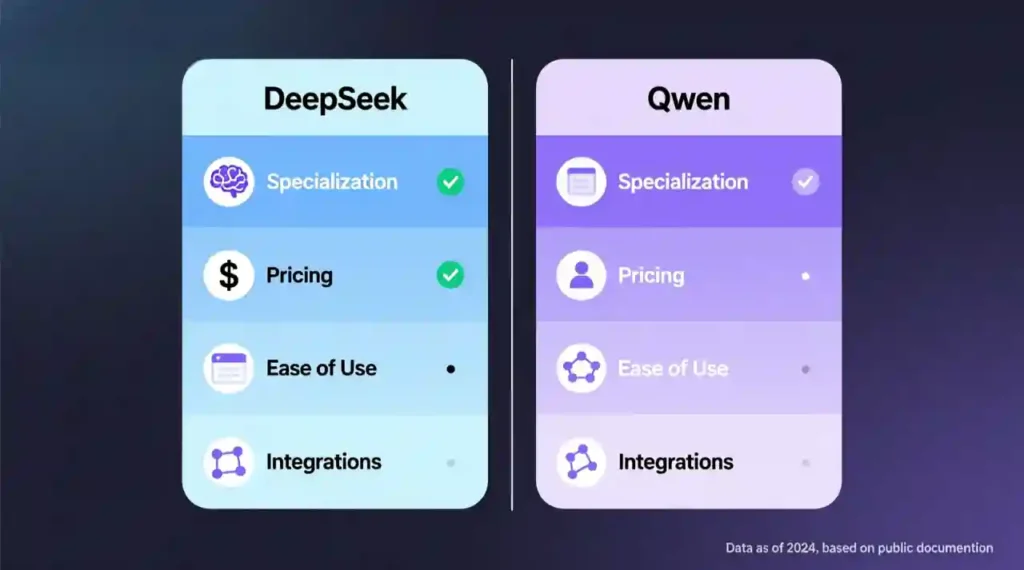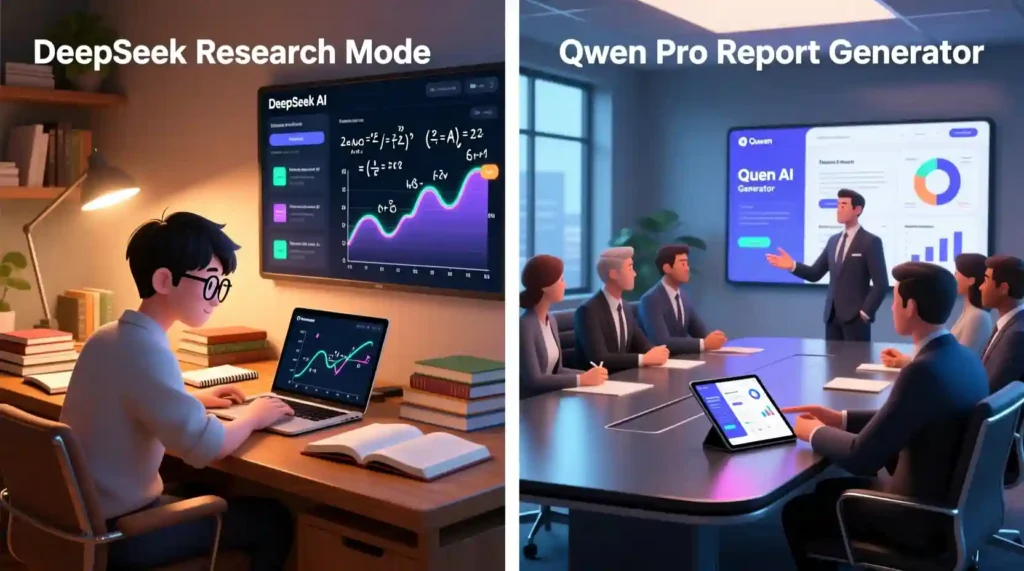
DeepSeek vs Qwen for Research Writing: The Ultimate 2025 Showdown
Introduction
Confession time: I once wasted three nights wrestling with an AI that just didn’t get it. I needed precise research notes for a client report — and instead, I got flowery fluff about “innovation trends.” That was the moment I realized not every AI writing tool is built for research. Some are storytellers. Some are nerdy problem-solvers. And when you’re on a deadline, picking the wrong one hurts.
That’s why the DeepSeek vs Qwen for research writing debate isn’t just some nerdy AI showdown. It’s a real choice that could mean finishing your thesis chapter in hours — or staring at the blinking cursor at 3 a.m. while questioning your life choices.
Here’s the gist: DeepSeek is the specialist — precise, math-smart, a little rough around the edges. Qwen is the generalist — smooth, versatile, and built for teams. Both are powerful, but in different ways.
By the end of this breakdown, you’ll know which AI actually matches your workflow, your budget, and (let’s be honest) your patience level.
Tool Overviews

DeepSeek: The Specialist
I’ll never forget the first time I tested DeepSeek. I fed it a nasty math-heavy research problem that had me stuck for days. To my shock, it crunched through the logic, line by line, and gave me a structured answer that actually made sense. No fluff. No hand-waving. Just straight reasoning.
That’s DeepSeek in a nutshell — the nerd in the group project who doesn’t care about pretty slides but nails the tough parts.
- Founder: DeepSeek AI Research Collective
- Launch: 2024–2025 (models from 1.5B to 70B params)
- Core Purpose: Technical research, math-heavy logic, advanced reasoning
- Target Market: Academics, researchers, engineers, solo power users
- Credibility: Trusted globally for its efficiency and accuracy on limited hardware
Bonus: it’s open-source. If you’re a tinkerer, you can dig under the hood, tweak things, and really make it yours.
Qwen: The Generalist

Now, flip the story. Last month, I was helping a friend condense 50 pages of dense economics papers into a digestible lit review. I tried DeepSeek first — great for the math models, but when I asked for a smooth summary? It felt like reading a robot’s diary.
Enter Qwen. Within minutes, it churned out a readable, almost “professor-friendly” summary — citations, structure, and all. That’s when I realized: Qwen doesn’t just get the what, it gets the how to explain it.
- Founder: Alibaba DAMO Academy
- Launch: Late 2023, with major upgrades in 2025 (Qwen 3.x)
- Core Purpose: Broad, enterprise-ready AI for research summaries, essays, and business writing
- Target Market: Teams, SMBs, agencies, and students who need polished outputs fast
- Credibility: Powered by 20 trillion tokens, MoE design for scalability
If DeepSeek is the nerd, Qwen’s the class president — maybe not top of the math league, but always knows how to get everyone onboard.
Feature-by-Feature Comparison of DeepSeek vs Qwen
Here’s where we get practical. Let’s line them up side by side.
| Feature | DeepSeek R1 | Qwen 3 | Verdict |
| Specialization | Technical, logic-heavy work | Creative + enterprise tasks | DeepSeek for logic, Qwen for broad use |
| Ease of Use | ✗ Steep learning curve | ✓ Smooth, beginner-friendly | Qwen wins for UX |
| Pricing | ✓ Budget-friendly, even free | ✗ Slightly pricier | DeepSeek better for indie/solo users |
| Support | ✗ DIY docs, forums | ✓ Enterprise-level support | Qwen wins for biz |
| Integrations | ✗ Limited, open-source add-ons | ✓ APIs, cloud tools | Qwen again |
| Scalability | ✓ Lightweight, local-friendly | ✓ Enterprise-grade | Tie — different lanes |
| Security | ✓ Transparent, open-source | ✓ Closed, compliant | Depends on your values |
| Performance | ✓ Laser-sharp on math/logic | ✓ Broad, consistent writing | Depends on task |
| Best For | Accuracy, technical reports | Summaries, content drafting | Case-by-case |
👉 Personal note: when I was co-hosting a mini hackathon last fall, the coder on my team used DeepSeek and absolutely crushed the algorithm puzzle section. But the project write-up? Let’s just say the judges nearly fell asleep. Then we tossed it into Qwen — boom, the summary popped. It was like watching two totally different personalities save the day in their own way.
Pricing Analysis: DeepSeek vs Qwen

AI pricing is one of those things where you think you’re saving money — until you hit usage caps or hidden compute costs. Been there, cursed that.
DeepSeek Pricing
- Free Tier: Yep. Slower inference, shorter context windows, but perfect for students or solo writers on tight budgets.
- Paid Plans: Around $20/month for priority inference and access to the bigger models.
- Hidden Costs: If you self-host, add compute/storage (though it’s still cheaper than most enterprise options).
- ROI: Killer for freelancers, PhD candidates, or small labs who need accuracy without blowing grant money.
Example: When I was freelancing for a niche engineering blog, I ran DeepSeek on my laptop and banged out precise drafts for technical articles. Zero extra cost for cloud credits.
Qwen Pricing
- Free Tier: Surprisingly generous, but throttled if you’re scaling for business.
- Paid Plans: Start around $25/month. Enterprise deals shoot up depending on seats and API usage.
- Extras: Multilingual output, integrations, full API support.
- ROI: Best if you’re running a content-heavy team or university lab where one license powers multiple people.
Pros & Cons
Every tool has its quirks. Here’s the unfiltered truth from my own use and stories I’ve picked up along the way.
DeepSeek Pros
- Ridiculously good at math + logic-heavy writing — I once used it to debug a client’s data model explanation, and it caught an error three PhD candidates missed.
- Runs on modest hardware — my old laptop groaned at Stable Diffusion, but DeepSeek? Smooth.
- Open-source flexibility — if you’re the type who customizes your workspace down to your terminal colors, you’ll love tinkering here.
- Budget-friendly — free or cheap tiers that actually deliver.
DeepSeek Cons
- UI feels… spartan — think Linux terminal energy, not sleek iOS vibes.
- Not great at flowy, creative writing — ask it for a Shakespearean sonnet, and you’ll regret it.
- Support is DIY — unless you enjoy combing GitHub issues at 2 a.m., you’re on your own.
Qwen Pros
- Smooth, readable outputs — when I needed to turn dense climate science notes into a policy memo, Qwen made it sound like something a human would actually read.
- Enterprise support — real customer service, not forum breadcrumbs.
- Handles diverse tasks well — research summaries, essays, customer reports, you name it.
- Plug-and-play for teams — no fiddling required.
Qwen Cons
- Pricier over time — especially if you’re scaling with multiple seats.
- Less transparent — closed source means you trust the black box.
- Not as sharp in ultra-specialized technical domains — it’ll smooth over answers instead of wrestling with the ugly math.
👉 Bottom line: DeepSeek feels like that brilliant but awkward lab partner. Qwen feels like the class president who gets along with everyone.
Use Case Scenarios
Pick DeepSeek if…
- You’re grinding through a PhD thesis and need airtight precision.
- You write technical whitepapers or research blogs where facts > flair.
- You want AI that doesn’t need a $5k GPU farm to run.
- You don’t mind a steeper learning curve in exchange for control.
(I once drafted an engineering report with DeepSeek, and my client asked if I’d hired another PhD to double-check my work. That’s how spot-on it was.)
Pick Qwen if…
- You’re running a business or agency where clarity and speed matter more than math proofs.
- You’ve got a team, and you need everyone to collaborate without friction.
- You often deal with summarizing huge volumes of research into digestible takeaways.
- You want support, integrations, and a smooth UX out of the box.
(A friend in grad school used Qwen to cut her lit review time from 3 weeks to 4 days. Her supervisor thought she’d hired research assistants — nope, just Qwen quietly saving her sanity.)
Migration Considerations
Switching tools can be a pain — I’ve done it, and it’s never zero-friction.
- DeepSeek → Qwen: Your biggest hurdle is moving from open-source exports to Qwen’s structured APIs. Not impossible, just some scripts and patience.
- Qwen → DeepSeek: Easier in terms of raw data (exports are straightforward), but you lose polished integrations. Be ready to get your hands dirty.
Pro tip: Test both side by side before committing. I’ve done this — run the same research prompt through both, compare outputs, and decide which one you’d actually turn in.
Final Recommendation

So, DeepSeek vs Qwen for research writing — who wins?
Honestly, it depends on who you are.
- If you’re an academic, researcher, or technical writer: DeepSeek is your jam. It’s precise, cost-effective, and thrives in niche domains.
- If you’re a business, agency, or team needing smooth readable outputs: Qwen will save you time, sanity, and endless formatting headaches.
- If you’re somewhere in the middle: Try both free tiers. Break them. See which one feels right in your workflow.
The future? Both are evolving fast. DeepSeek is doubling down on precision and efficiency, while Qwen’s racing ahead with enterprise scaling. In 2026, we may be having this same debate with completely new features on the table.
👉 My personal nudge: if you’re budget-conscious and love tinkering, start with DeepSeek. If you want zero friction and support, go Qwen.
FAQs (DeepSeek vs Qwen)
1. Which is better for students, DeepSeek or Qwen?
If you’re writing a technical thesis or dealing with heavy math, go DeepSeek. If you’re summarizing sources and need readable essays, Qwen is easier.
2. Can DeepSeek write creative content?
Not really. It’ll try, but it shines in logic-heavy tasks. For creativity, Qwen’s the safer bet.
3. Is Qwen safe for academic integrity?
Yes, but remember: AI is a co-author, not your ghostwriter. Always cite, verify, and add your own insights.
4. Does DeepSeek work offline?
Yep — one of its biggest perks. You can run it on modest hardware without being tied to the cloud.
5. What’s the cheapest way to test both?
Use the free tiers. Push them to the limit with your real research prompts. That’s how you’ll know which one sticks.
Final Nudge (and Call-to-Action)
So there you have it — the ultimate DeepSeek vs Qwen for research writing breakdown. I’ve been burned by the wrong tool before, and trust me, picking the right one saves more than time. It saves your sanity.
Now it’s your turn:
👉 Which one are you leaning toward — DeepSeek’s precision or Qwen’s versatility? Drop a comment below.
Example: A buddy of mine runs a small marketing agency. They plugged Qwen into their workflow and suddenly knocked two days off their usual turnaround for research-backed blog posts. At ~$25 a seat, it paid for itself within the first week.
